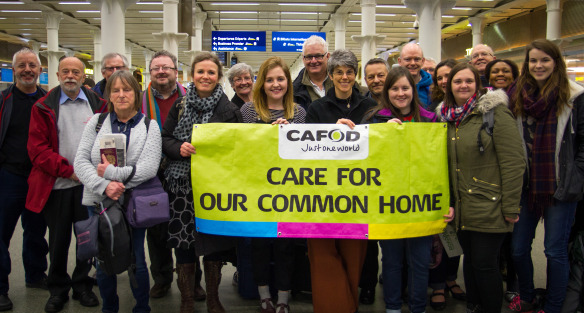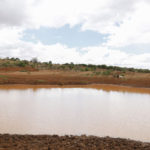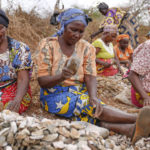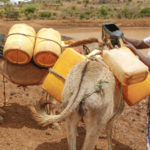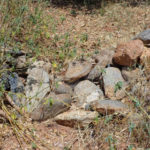Youth leaders: The People’s Climate March
January 13, 2016
Leah Fox is a volunteer at Youth Ministry Team in the Diocese of Hexham and Newcastle. Here she reflects on her first experience of campaigning with CAFOD. In March Leah will be continuing her journey with CAFOD’s campaigning in a visit to Parliament with other youth leaders from across the country.
At the end of November I was asked to go and join CAFOD at the People’s Climate March in London. This was a peaceful demonstration to voice the opinion to world leaders that they need to act against climate change, just before they met in Paris to make some very important decisions. Climate change affects so many people across the world, but especially those living in poverty, so I was very excited to be joining others to help encourage world leaders to recognise and act on this issue.
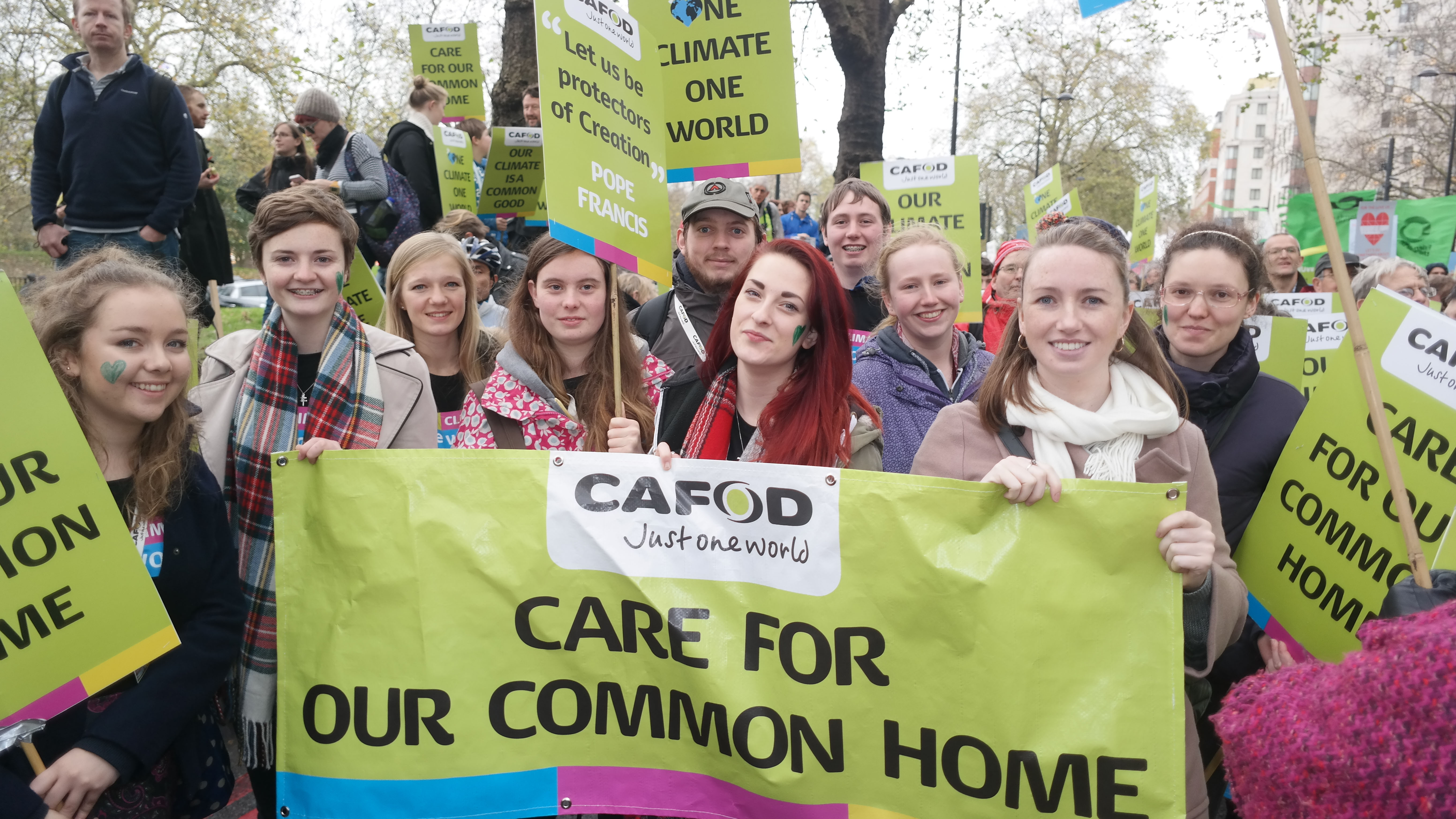
Get crafty and make, wear and share a green heart this Valentine’s Day
When I was asked to go, I wasn’t really sure what to expect. I had never been on any sort of march so I naively thought that there might be a few hundred people marching through London, interrupting people’s busy lives. So I was very surprised to join over 50,000 people walking from Hyde Park to Whitehall!
When we first arrived at the meeting point for the entire march we made our way to the section which had people from different faith groups marching together, towards the front. CAFOD was one of many faith-based charities that were marching. There were more people there already than I could ever have imagined. Soon we all had a CAFOD placard and a few others and myself drew green hearts on our faces to represent CAFOD. The energy from the march was amazing, with cheering, music and people talking over speakers. Politicians from every major political party spoke before the march to show what their party would do to prevent climate change.
Find out more about climate change
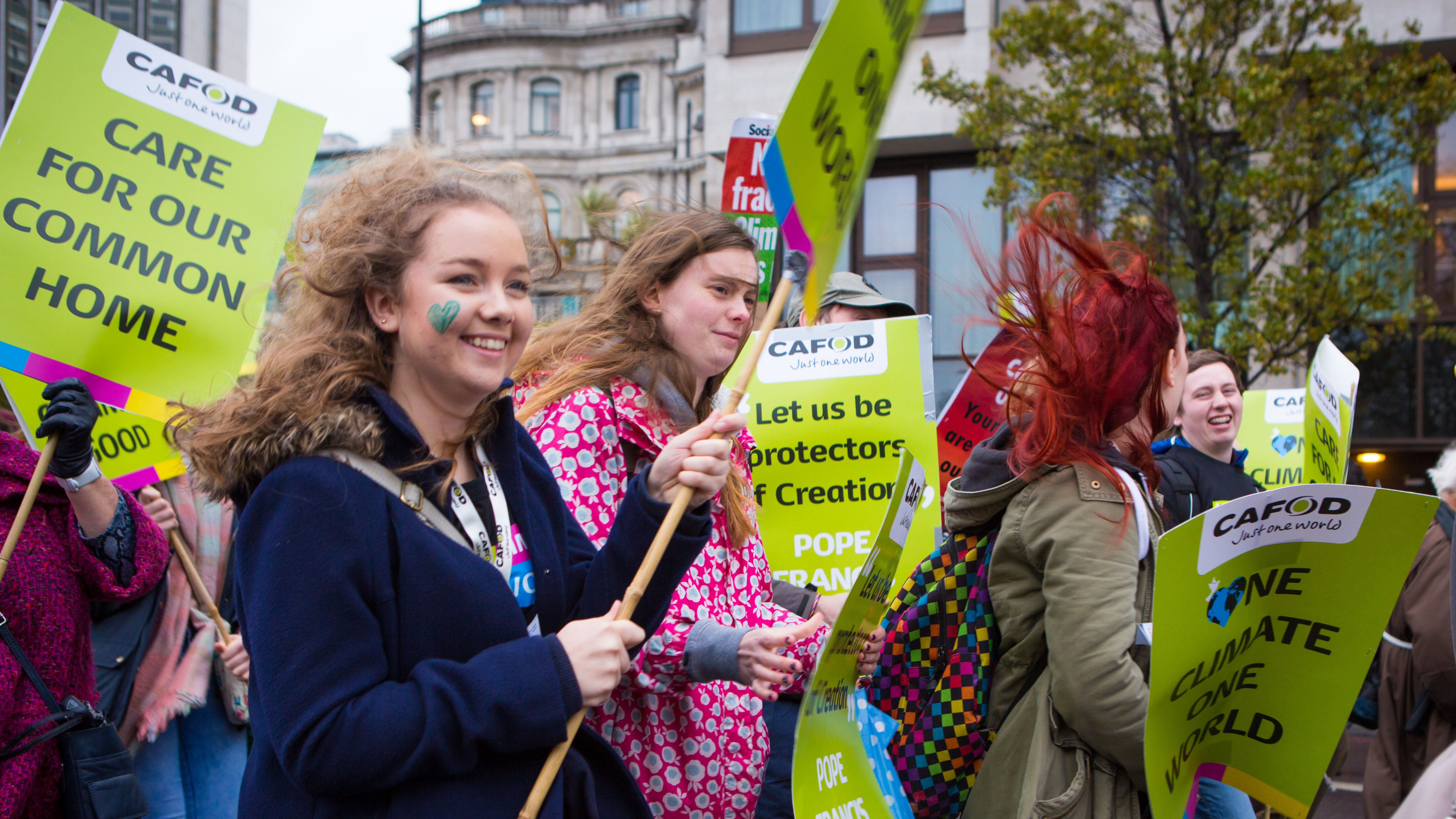
Throughout the march we saw people from different charities marching on behalf of different reasons (some were even dressed as polar bears or bumble bees!) but despite the many reasons for people being there, it felt amazing to be united with so many people, marching for one outcome – to stop climate change. I got to talk to many people from CAFOD and other charities over the course of the march and talk about my faith and the amazing things we can do to help raise awareness of climate change and how it’s affecting communities across the world.
At the end of the day, we were all very tired from walking, but left the walk feeling very happy and fulfilled knowing that we had helped raise awareness to people that climate change is a problem and needs to be stopped.
Join our campaign, One Climate, One World to protect our common home.
Climate change campaign: Thank you
January 12, 2016
Sarah Hagger-Holt works in CAFOD’s campaigns team on the One Climate, One World campaign.
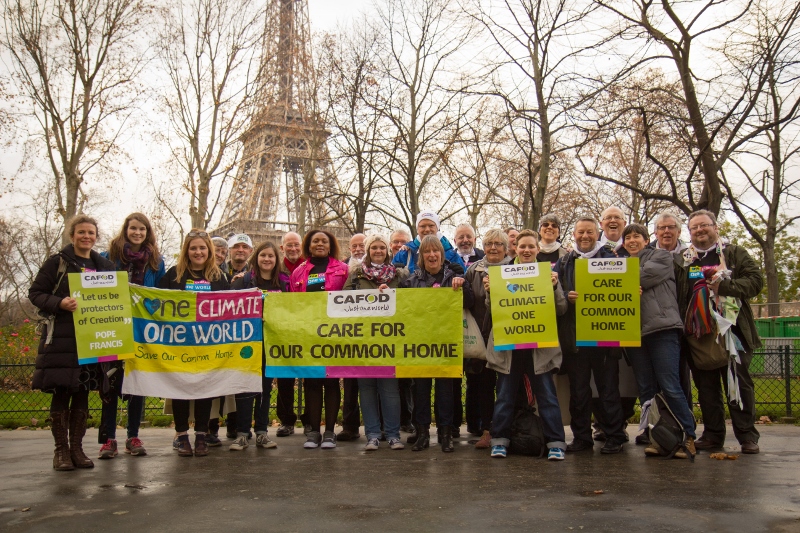 Last month, I was part of something very special, a moment in history.
Last month, I was part of something very special, a moment in history.
I was in Paris, joining hands with campaigners underneath the Eiffel Tower and praying outside the conference centre where a global climate deal was finally agreed.
At CAFOD, we know that faith groups, including Catholic campaigners, have a huge influence on politicians – including those from the 196 countries who agreed a deal to tackle climate change in December. Their dedication and tenacity often inspires and moves me.
It’s not often what they have done is publically acknowledged. But now it has been.
This letter from Christiana Figueres, who heads up the UN’s work on climate change, is addressed to you, and to everybody who took part in this campaign.
Read it, share it, print it out– this is for you. Thank you.
An open letter of gratitude to all
To those who walked, to those who prayed,
To those who sang, to those who cried,
To those who challenged, to those who supported,
To those who acted early,
To those who came with hope,
To those who came with facts,
To those who used the power of their influence,
To those who honored the public trust bestowed upon them,
To all those, the millions of people around the world
who laboured now and before,
so long and so hard, I say:
This is your success.
Individually for each of you, but more powerfully, collectively for all of us.
A critical milestone reached, a decisive turning point inscribed into history.
We have come together to address the most daunting of challenges. We have done so by respecting our differences and setting aside our enmity, by focusing on the present we share and the future we must build together.
As we celebrate this momentous step, may we remember that the journey ahead, although irreversible, will equally require our determination, our ingenuity, the best of our humanity and above all our community of purpose.
Together we can.
Christiana Figueres
CAFOD corporate partner: cycling 180 miles for Kitui
January 5, 2016
Paul Bennett is Executive Chairman at CAFOD corporate partner b:ssec. Here he tells us about the huge challenge he and Wayne Ward, Managing Director of b:ssec, are taking on for CAFOD.
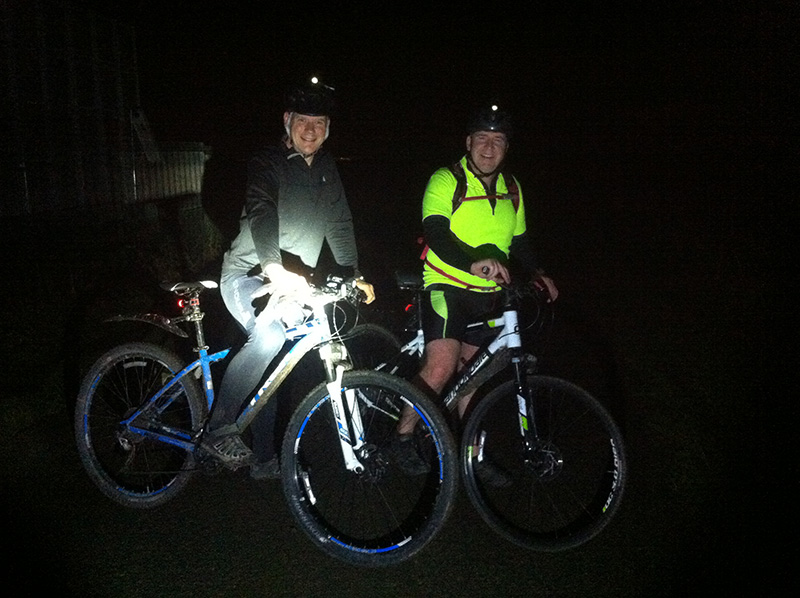
For three days in May 2016, Wayne and I will be taking our mountain bikes off road and cycling 180 miles in aid of CAFOD. The ‘Wessex Way’ ride takes us from Westbury in Wiltshire to Beachy Head in East Sussex, across rough terrain and through some really varied landscapes.
It’s a ride that has been on my bucket list for a while. Life is too short not to do what you love! Wayne was mad enough to join me on it – so great. What’s fantastic about this challenge is we will be having fun, reducing the middle age spread and raising money for CAFOD. Any sponsorship that we receive will go towards supporting vulnerable farmers in Kitui, Kenya, to grow enough food, access clean water and engage with the local government on the issues that prevent them from earning a living.
Please sponsor us via JustGiving
CAFOD is helping farming families in Kitui to plant seeds and to terrace their farms, re-sculpting the landscape to keep rainwater where it is needed and stop topsoil from being washed away during the rainy season. So that crops flourish, the farmers are being supplied with solar-powered drip irrigation kits and sand dams to collect rainwater. We are proud to be involved in making this important work happen. Continue reading “CAFOD corporate partner: cycling 180 miles for Kitui”
Hands On Kitui: Signs of success
December 18, 2015
Hands On Kitui is the first of our special series of projects that allows donors to give monthly and directly support a particular community. Find out how you can help the community of Altiplano in Bolivia.
Work continues at great pace as we hurry to get the Musosya dam ready for the coming rains. One fantastic piece of news is that our reservoir is now holding water, which had been in the ground following the previous rains. This means that even during dry periods the community here is able to access clean water for their households – a wonderful achievement.
We would also be delighted to take this time to wish you a happy and peaceful Christmas. Please do keep Kitui in your thoughts at this joyous time, we have made so much progress thanks to your kindness.
Our beautiful Advent calendar provides space every day to reflect and pray.
Progress and project highlights this month
Did you know?
Gabions are wire cages filled with rocks, which sit across tributaries to the reservoir. When it rains, they will reduce the speed of the streams and will trap silt, stopping it running into the reservoir itself.
Year of Mercy, Doors of Mercy
December 18, 2015
On International Migrants Day, CAFOD’s Susy Brouard reflects on the Jubilee of Mercy and compassion for refugees.
Susy Brouard from CAFOD’s Theology Programme reflects on the new Doors of Mercy which are being opened around the world, and the ones which already exist…..

Last week Pope Francis launched the Extraordinary Jubilee of Mercy by pushing open the normally bricked-up bronze doors of St Peter’s Basilica in Rome. This was the very first Door of Mercy to be opened this Jubilee year, which began 8 December. The Holy Father asked Catholics that as they walk through it, they should take on the role of the Good Samaritan.
Throughout England and Wales, dioceses, schools and parishes have taken up the Pope’s initiative in diverse ways – my personal favourite is the Jubilee of Mercy double-decker bus which will tour parts of Greater Manchester and Lancaster come February next year. Inside, priests will be available for confession, a blessing or simply a chat.
Opening new Doors of Mercy is a fantastic idea which will open up spaces where people can find healing and reconciliation. However, last week, in conversation with a Religious sister who works with vulnerable women, she raised the fact that there already are, within and outside the Catholic Church, Doors of Mercy, which people walk through daily and find places of healing and sanctuary. How true, I thought!
Download our Jubilee of Mercy reflection
Opening Doors of Mercy
As a CAFOD member of staff I began to reflect on where the Doors of Mercy are in our work. I thought immediately of the work that our sister agencies in the Caritas network are doing with refugees. Surely any entrance to a building which provides a safe refuge for those who have nothing is a Door of Mercy? Surely any entrance to a building which provides sanitation facilities, psychosocial support and above all, a warm and genuine welcome, is a Door of Mercy? These Doors, as well as the new ones, need to be highlighted and celebrated.
World Gifts: perfect Christmas presents!
December 10, 2015
Hannah Patterson is CAFOD’s World Gifts Co-ordinator
I have to confess that I started planning for Christmas in July. Not because I’m super-organised, or because I was hoping to bag some bargains, but because that’s when we started to create the World Gifts Christmas catalogue.
We start work on the World Gifts catalogue early because we want to present a really fantastic list of gifts for our supporters to choose from. At any time of year, researching examples of the impact of CAFOD’s work is inspiring, although it was more of a challenge to choose between snowflakes and stars in the summer!
A gift that stands out for me this year is Motivating music. Costing £20 for an instrument and lessons, the certificate that comes with this gift tells Marcos’ story. Marcos, 14, from Brazil, had to take on the responsibility of caring for his father while he was unwell, and then suffered feelings of guilt when his Dad passed away. Learning to play the cello has given him an outlet for his feelings and boosted his self-esteem. Marcos now wishes to become a professional musician.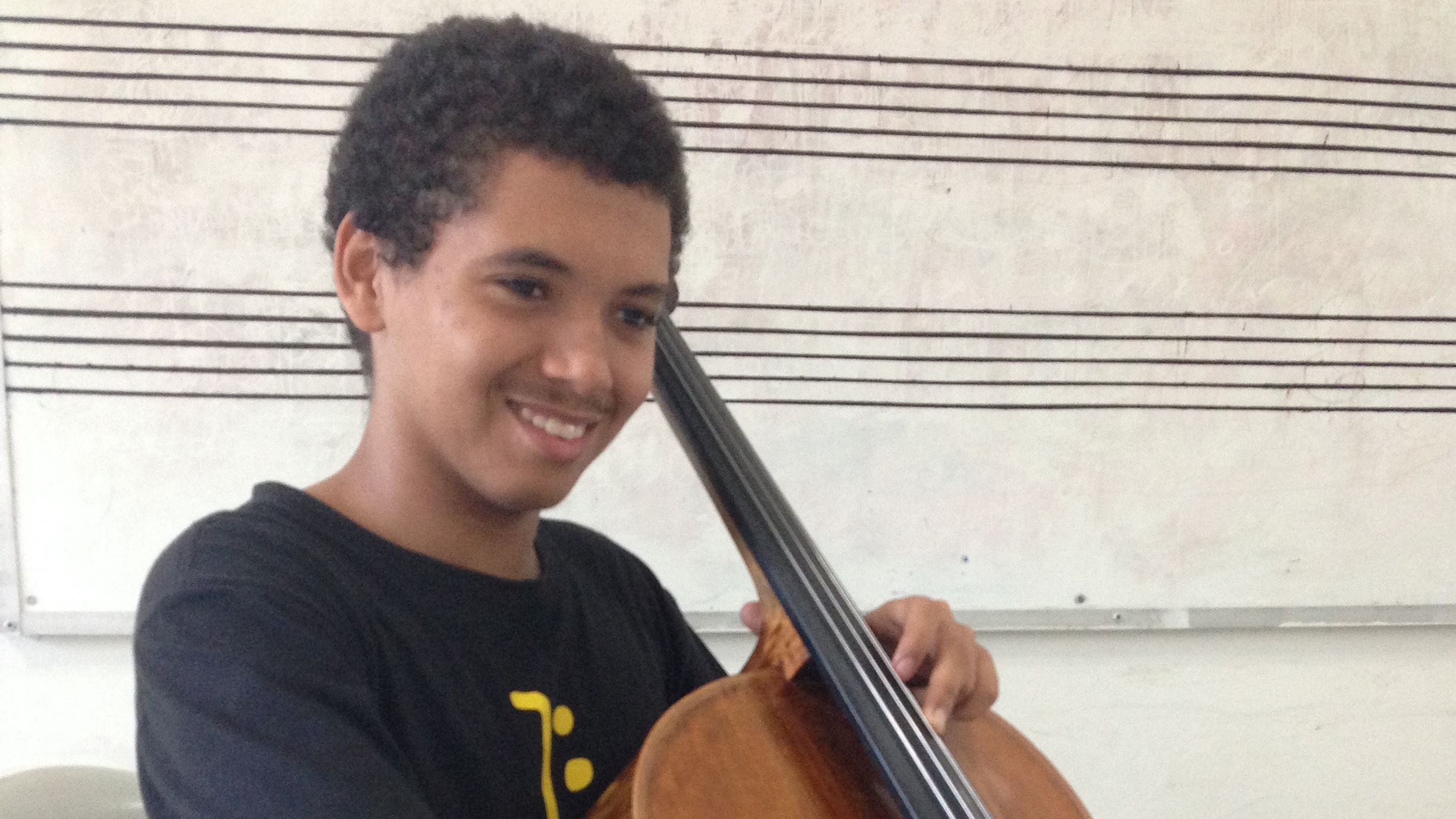
Motivating music is already on my gift list for my brother because he loves music. In fact, many of my loved ones will be receiving a certificate from me on Christmas morning! I think that at this time of year, when it’s easy to get caught up in the whirlwind of present-buying, food-planning and Christmas-jumper-wearing, World Gifts are a simple way to choose something more meaningful. Like many of you, I’ll also be showing my family and friends I love them this Christmas by making a special effort to spend time with them and I’ll be helping to bring other families together by buying the Water for a family gift for my Mum and Dad.
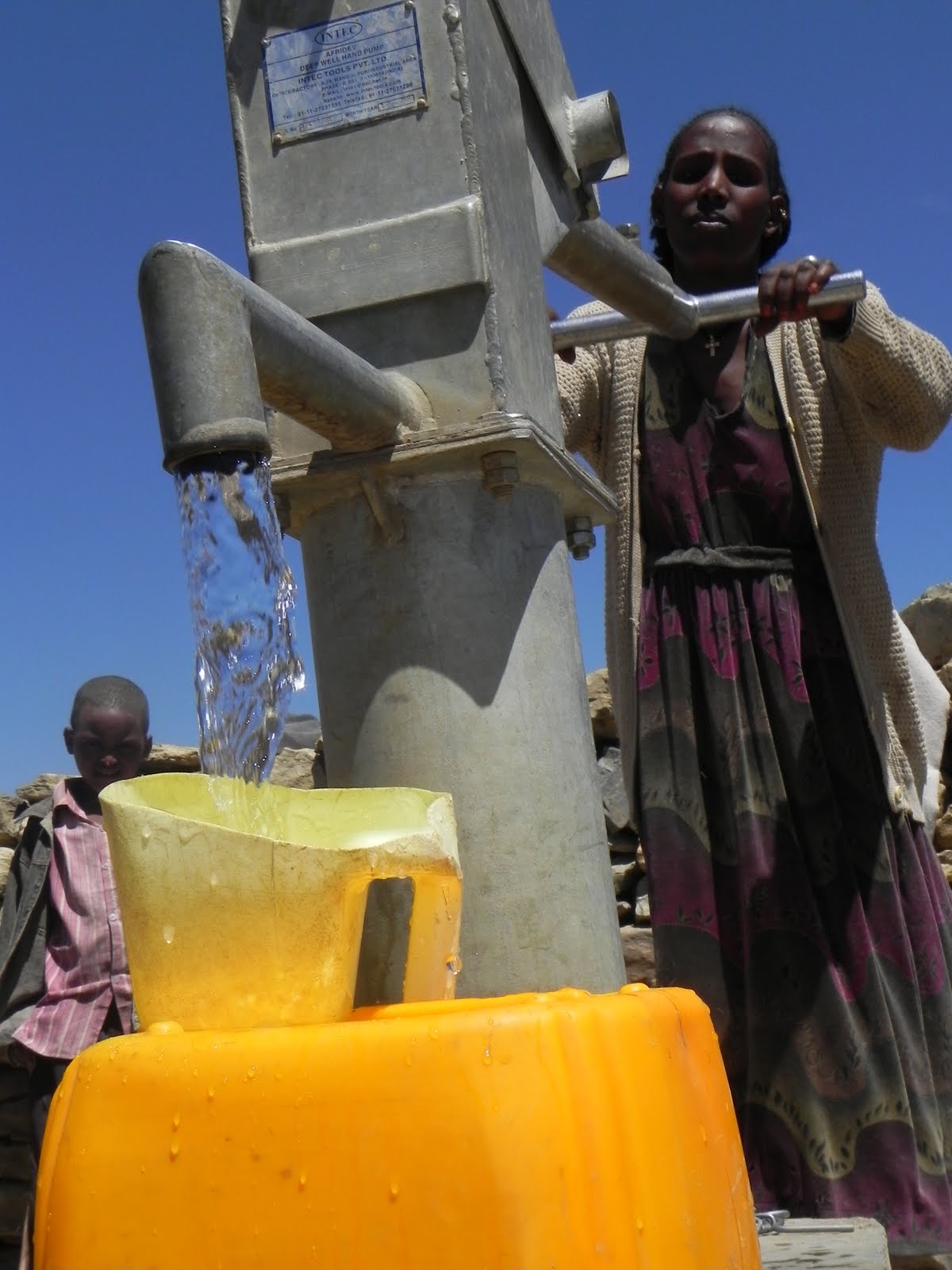 Hadas Hailu’s family in Ethiopia used to suffer a lot due to a shortage of clean water. Not only did they have to spend time fetching water from a pump far away, but the water wasn’t clean and caused diseases. Thanks to World Gift donations, CAFOD’s local partner were able to construct a borehole in their remote village. Now the whole family has clean, safe water to drink, and instead of fetching water they now have more time to spend together.
Hadas Hailu’s family in Ethiopia used to suffer a lot due to a shortage of clean water. Not only did they have to spend time fetching water from a pump far away, but the water wasn’t clean and caused diseases. Thanks to World Gift donations, CAFOD’s local partner were able to construct a borehole in their remote village. Now the whole family has clean, safe water to drink, and instead of fetching water they now have more time to spend together.
Having clean water to drink seems like such a basic need that it’s hard to imagine not trusting your water supply won’t make your family sick, or spending time away from them collecting heavy containers. The water gifts that are available through World Gifts are a great way to make a practical difference for families.
Perhaps I’m biased, but I think we have a wonderful range of World Gifts this year. Gifts like Water for a family are examples of the practical work that CAFOD’s partners carry out daily. Presents such as Motivating music bring hope to those living in poverty mean you can share this hope and joy with your own loved ones. I hope you enjoy reading through your catalogue or browsing our website as much as I’ve enjoyed putting together the World Gifts range.
To buy World Gifts or order a catalogue, visit our website.
All Saints Young Climate Bloggers reflect on food waste
December 9, 2015
Throughout this year we have been blogging for CAFOD about climate change. When I first started I thought it would be mostly just about global warming and saving energy, but I have learnt it is so much more than that. I have never really stopped to think about how the actions of people in this country affected the lives of those in poorer countries.
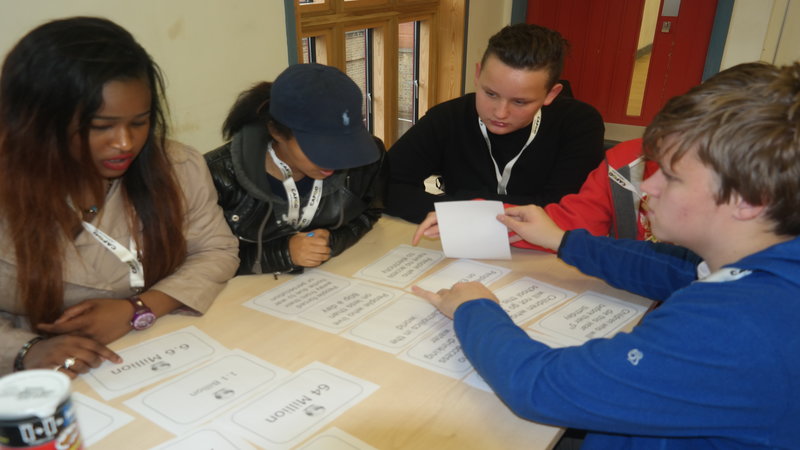
As well as saving energy, we need to think about how much of the earth’s resources we use and how wasteful we are.
Watch our Laudato Si’ animation and be inspired
Everyone talks about how we, as a country, need to save money and learn to live on less but I never really stopped to think about the big difference each family can make. Last week I watched Hugh Fearnley-Whittingstall’s programme on food waste.
Continue reading “All Saints Young Climate Bloggers reflect on food waste”
Sr Karen: Why I’m travelling to Paris with CAFOD for climate change action
December 7, 2015
Sr Karen d’Artois OP is a Dominican nun from the Archdiocese of Westminster. She’s part of a delegation of CAFOD campaigners travelling to the UN ‘COP21’ meeting in Paris, calling on world leaders to agree to action on climate change to prevent people in the poorest communities being pushed deeper into poverty.
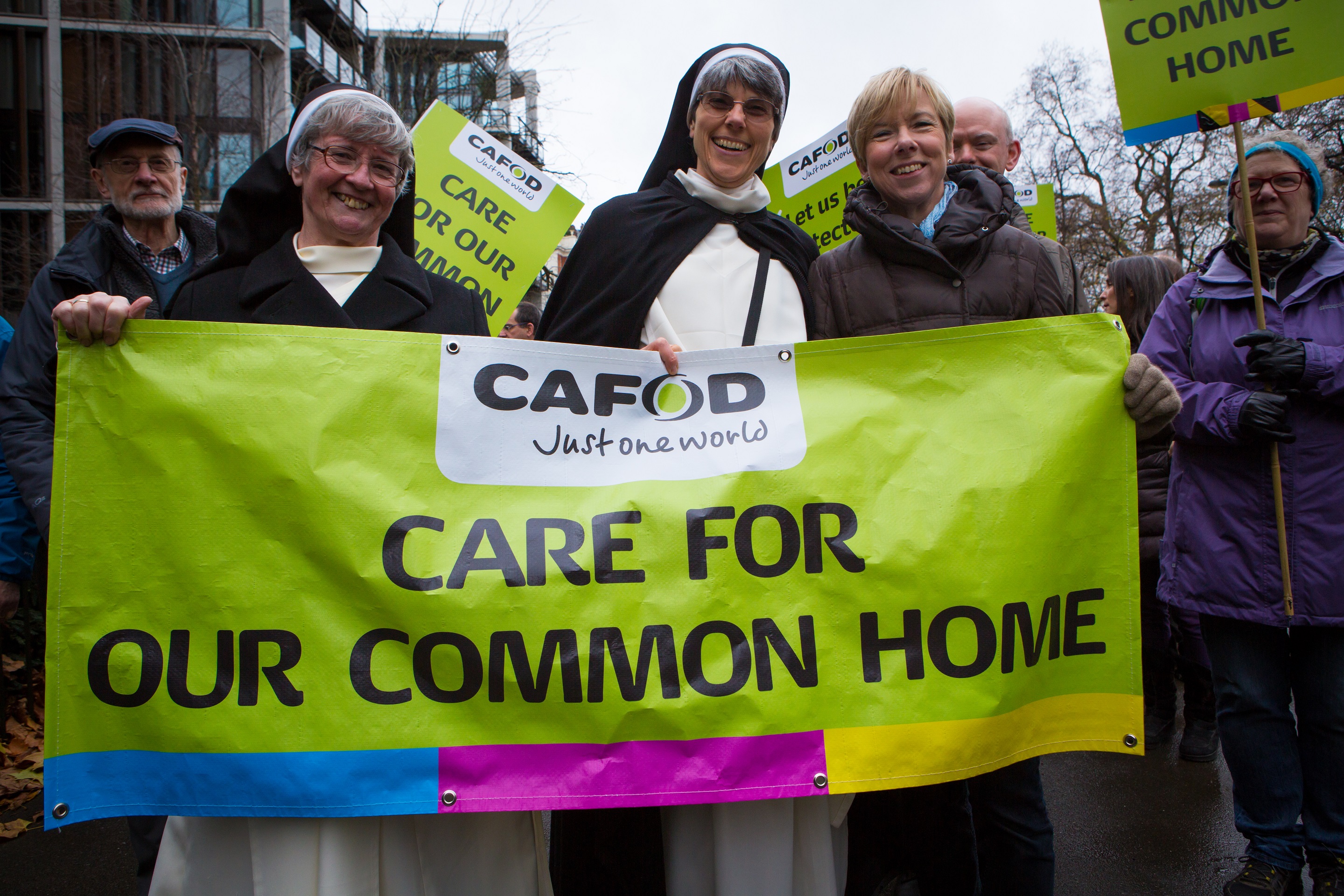
I learned very young, when I was aged 10, that politics isn’t a ‘spectator sport’.
Studying Politics at university, I realised the same about my Catholic faith. That belief inspired my vocation as a Dominican Sister: to bring together faith and politics in the quest for truth.
To me, the idea that ‘faith has no place in politics’ is rubbish! Faith, in some form, is the basis of every person’s thinking and acting. Jesus criticised the unjust political and social circumstances of his day and appealed for change: he called it the Kingdom of God. As a follower of Jesus, I’m called to help build that Kingdom — where justice and opportunity are within everyone’s reach.
Learn about Pope Francis’s Encyclical
The Climate Summit in Paris is a chance to speak up for planet Earth and the goodness of creation. It’s at risk from our reckless behaviour and misuse of resources. Faith and politics aren’t opposites; they depend on one another. My Catholic faith is the foundation of my politics and activism, and politics informs my faith. Continue reading “Sr Karen: Why I’m travelling to Paris with CAFOD for climate change action”
World Gifts: why I’m asking for alternative presents this Christmas
December 6, 2015
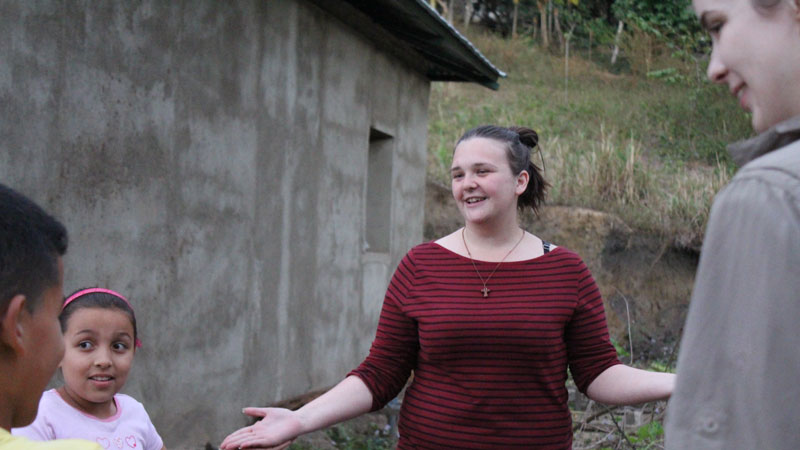
Bernadette Goddard took part in the Step into the Gap programme last year. In this blog she describes why the work of partners in Nicaragua inspired her to ask for World Gifts as Christmas presents this year.
As Christmas approaches every year I am asked the question what would I like. It’s a double question for me as my birthday is just five days before Christmas, on 20 December. Each year I receive many gifts, often ones which, if I’m honest, I don’t need or use. In previous years I’ve asked for things which would be useful. Last year I was about to embark on a life changing trip with CAFOD to Nicaragua and people helped with my kit list, buying me useful items to take with me such as torches and plug adapters! This Christmas I have decided to appeal to family and friends on social media to buy World Gifts.
Continue reading “World Gifts: why I’m asking for alternative presents this Christmas”


